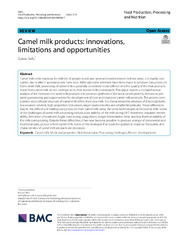Perceptions and attitudes of communities on socio-economic importance of camels and consumption of camel milk and camel milk products in Kgalagadi District, Botswana.
Date
2021Author
Tselaesele, Nelson
Seifu, Eyassu
Molapisi, Moenyane
Boitumelo, Wame
Angassa, Ayana
Kgosikoma, Keneilwe
Teketay, Demel
Sekwati-Monang, Bonno
Chimbombi, Ezekiel
Kobue-Lekalake, Rosemary
Bultosa, Geremew
Haki, Gulelat Desse
Witness, Mojeremane
Kgaudi, Katsane
Mokobi, Boitumelo
Metadata
Show full item recordAbstract
Camels were introduced to Botswana in the early twentieth century as a means of transport for
the Botswana Police Service in the Kgalagadi District. This service was discontinued in the early 1980s
and the camels were handed over to communities in the district for ecotourism activities. Since their
introduction in Botswana, camels were regarded as government property and were never taken as
alternative livelihood option that can alleviate poverty by providing milk and other products as is the
case in other countries. This study explores the prospects of utilization of camel milk and milk products
by assessing perceptions and attitudes of communities on the socio-economic importance of camels,
consumption preferences for camel milk and value-added milk products. A combination of qualitative
and quantitative methods was used to address the objectives of the research. This included a focus group
discussion and a structured questionnaire that were used to determine the perceptions and attitudes of
participants towards camels, camel milk and camel milk products. The strengths and opportunities
associated with production of camel milk and milk products were higher than the weakness and threats;
the respondents appreciated camel milk and milk products as weighed against their socio-cultural
practices. The majority of the respondents would consume camel milk and milk products though not on
a daily basis. There is no socio-cultural factor that hinders the use of camel milk and camel milk
products and raising camels in the Kgalagadi District; the respondents had a positive attitude towards
camels, camel milk and milk products.
Collections
- Reseach articles [146]
Related items
Showing items related by title, author, creator and subject.
-
Physicochemical properties of butter made from camel milk
Berhe, Tesfamariam; Seifu, Eyassu; Kurtu, Mohammed Y. (Elservier, 2013)The making of butter from camel milk using a traditional churning method and the physicochemical properties of the butter were assessed. Camel milk was obtained from pastorally managed camels in the Erer valley, eastern ... -
Camel milk products: innovations, limitations and opportunities.
Seifu, Eyassu (BMC, 2023-03-04)Camel milk is the mainstay for millions of people in arid and semi-arid environments. In these areas, it is mainly consumed raw or after it spontaneously turns sour. Although some attempts have been made to produce dairy ... -
Community-based camel ecotourism in Botswana: Current status and future perspectives
Seifu, Eyassu; Angassa, Ayana; Boitumelo, Wame Shimane (International society of Camelid Research and Development, 2019-01-15)Ecotourism is a form of tourism that involves visiting fragile, pristine, and relatively undisturbed natural areas, intended as a low-impact and often small-scale alternative to standard commercial (mass) tourism. Ecotourism ...



